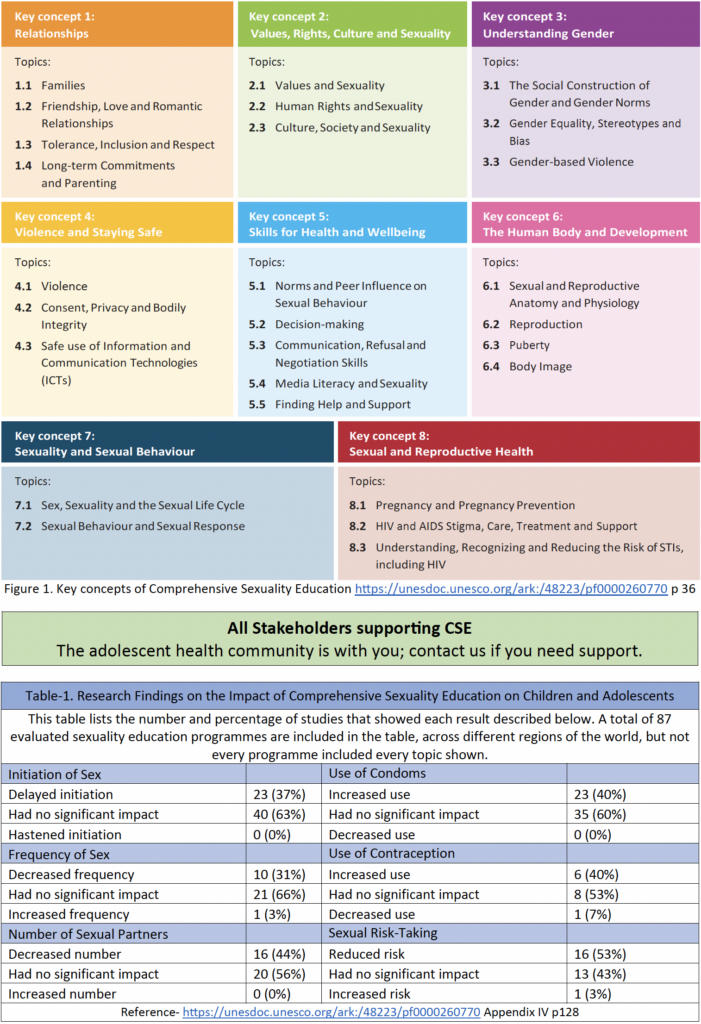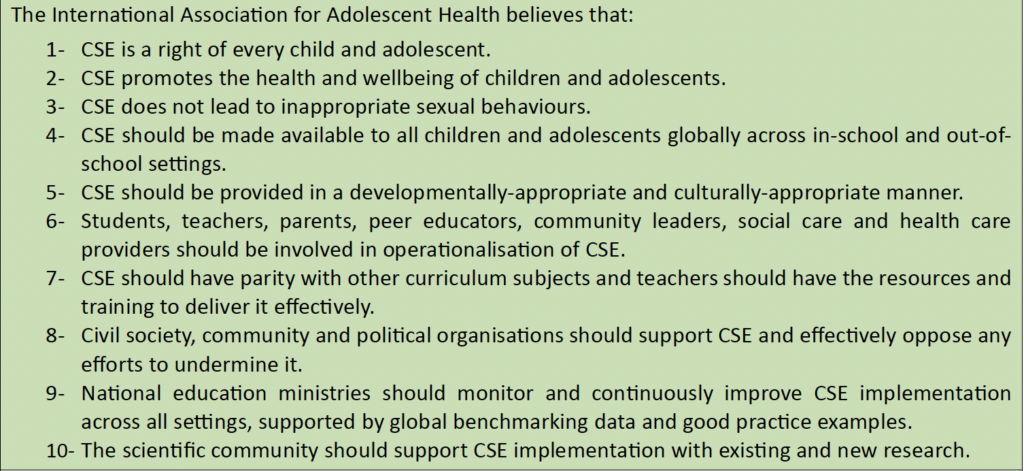An Open Letter from the International Association for Adolescent Health (IAAH) about Comprehensive Sexuality Education
Gray, N., Pemde, H., Sawyer, S., et al., on behalf of the IAAH Council. (2023). An Open Letter from the International Association for Adolescent Health (IAAH) about Comprehensive Sexuality Education. International Association for Adolescent Health. Quebec, Canada. Doi:10.61576/iaah.2023.101
Download PDF – English
Descargar PDF – Spanish
We need our children to grow and develop to become socially connected, productive adults who are able to engage and contribute to their communities. This process involves supporting their physical growth alongside their emotional, social, spiritual, and sexual development – starting at birth. Developing a positive and healthy understanding of sexuality is as central to children and young people as every other area of human development.
Now, more than ever, we need to support adolescents across the world to be informed and take control of their sexual health and wellbeing. Global health challenges, including the closure of many sexual health services because of the pandemic, national economic crises, and political/philosophical belief systems impeding human rights, collide with the rapid expansion of technologies that penetrate even the most private aspects of personal life. This means that our biggest ever global population of young people face more complex threats to sexual health and wellbeing than previous generations, with fewer resources to counter them. Comprehensive Sexuality Education (CSE) is vital for healthy development and schools are the right place to deliver this, alongside the efforts of families at home.
Since the beginning of the 21st century, international high-quality research has shown that school-based CSE programmes lead to: delayed initiation of sexual intercourse; decreased frequency of sexual intercourse; decreased number of sexual partners; reduced risk taking; increased use of condoms; and increased use of contraception. Moreover, CSE decreases gender-based violence, prevents sexual abuse of children, and decreases risk factors for depression and suicidality amongst youth. It allows children and adolescents to fully understand consent. The common-sense key concepts of CSE (Figure 1) show different aspects of sexual development that are vital to wellbeing.
From the members of its global network, IAAH has noted a surge in communications to Governments and the media that express concern about the teaching of CSE in schools. As the Council of an organisation that supports health and education professionals who serve adolescents and their families, we see danger in every effort to undermine CSE.
We believe that every parent wants their children to have fulfilling relationships that are free from harm. We also understand that, despite the best of intentions, many parents find it difficult to have the conversations that equip adolescents with the knowledge and skills to negotiate the complexity of contemporary relationships, including those online. School-based CSE ensures that students have the developmentally-appropriate, culturally-appropriate, evidence-informed and professionally supported information across their schooling that they need to counter the avalanche of inaccurate and exaggerated representations of sex and relationships in the media.
CSE is thus shared between school and other institutions including the family. School-based CSE does not replace the parental roles and responsibilities in educating children about their reproductive health, but rather augments it. It is important for educators to receive training that takes into account different ages, stages of development, sexual orientation and identity, and national context, in order to deliver accurate and suitable information with competence and confidence. In partnership with families and community leaders, this is how we equip and empower our children.
We believe that it is not a coincidence that a group of people are challenging national governments, UNESCO and WHO. We believe that this is an orchestrated attempt by a group of ideology-driven organizations, which are neither interested in the evidence nor the context, to undermine years of legislation and advocacy that both protect the rights of children and adolescents and also save lives.
It is not the right of adults to enforce ignorance on their own children, or other people’s children. It is important to see these challenges to CSE for what they are, an orchestrated attempt to undermine adolescents’ access to evidence-based, developmentally-appropriate and culturally-appropriate information.
We will rally behind those who are being challenged and encourage them to stand firm. Young people need us to do so. We hope that like-minded civil society organisations, academic leaders, community and faith-based organisations, political parties, and nations will join with us to denounce organised efforts to undermine CSE.

What is the IAAH position on Comprehensive Sexuality Education (CSE)?

What can we do?
Young People, Parents and Community Leaders: If you feel that you need more information about CSE, please look at this Q&A prepared by WHO. Schools will be happy to speak with you about their CSE plans. If there is no CSE in your local school yet, please ask your education and health professionals how you can get involved in making it happen!
Policymakers and Politicians: Read this article to see how Parliamentarians are prioritising CSE – you are not alone! Find out how other countries are innovating in this field through case studies. Talk to community leaders, teachers, young people and parents – what do they think?
Media professionals: Please think critically about any approaches from people about this subject. Who are they? Who do they represent? Who else in your community can comment on the subject and provide some balance? What do local young people think – where is their voice?
Health professionals: Please brief yourself about the evidence base on CSE (summarised in Table 1) and make yourself available to your local schools and to media professionals. Think about the sex, reproductive health and relationship needs of your community – what problems do young people consult you with? How can CSE address their needs? How can families help? Offer support to parents, so that they can educate their children and young people in the home as well.
Education professionals delivering CSE: Consolidate your relationships with families, community leaders and local health professionals. Present a united front when challenged by people who do not have the best interests of your young people at heart. Seek out opportunities to engage with local media to tell the ‘good news’ stories of your experience. Reach out to other professionals currently delivering CSE. It could be useful to update your knowledge about CSE so that you can be a champion for CSE delivery.
Education professionals not yet delivering CSE: If you are uncertain about the need for CSE, please read about what is happening around the world, and how you can innovate in your country. You should be able to find school curricula and ministerial directives, which recommend CSE in most countries. This could help you appreciate its importance and dispel misconceptions you might have about why it should be taught in schools. If you already appreciate the need for CSE, reach out to others currently delivering it to find out more about their experiences and be an advocate for CSE delivery. These attacks on CSE in schools are dangerous, but they may also provide an opportunity to advocate for extending CSE into your context. Start with families and community leaders – what do they know, and how can the provision of CSE in your schools help your young people?
Notes
The International Association for Adolescent Health (IAAH) is a multidisciplinary, non-government organization which aims to improve the health, development and wellbeing of 10-24-year-old adolescents and young adults, in every region of the world. Since its inception in 1987, IAAH has been committed to evidence-informed practices and policies, and to ensuring that young voices inform our work. https://iaah.org/

Please contact us for further information using the email address: [email protected].
Twitter: @IAAHGlobal https://twitter.com/IAAHglobal
Facebook: https://www.facebook/com/globalIAAH/
Instagram https://www.instagram.com/iaahglobal/
LinkedIn: IAAH YPN https://www.linkedin.com/groups/13560236/
Additional Resources
Council of Europe (2007). Convention on the Protection of Children Against Sexual Exploitation and Sexual Abuse (CETS No. 201). https://rm.coe.int/1680084822
Global Partnership Forum on CSE (2023). The case for healthy, informed and empowered learners (Flyer). https://healtheducationresources.unesco.org/sites/default/files/resources/GPF_the_Case_For_Healthy_CSE%20March%2023.pdf
PMNCH (2023). 1point8 Billion Young People for Change – Global Forum for Adolescents 2023. https://www.1point8b.org/
UNESCO/UN (2018). International Technical Guidance on Sexuality Education – An evidence-based approach. https://unesdoc.unesco.org/ark:/48223/pf0000260770
UNESCO/UN (2021). The Journey Towards Comprehensive Sexuality Education: A Global Status Report. https://unesdoc.unesco.org/ark:/48223/pf0000379607
UNFPA/UN (2020). International Technical and Programmatic Guidance on out of school CSE. https://www.unfpa.org/featured-publication/international-technical-and-programmatic-guidance-out-school-comprehensive
WHO (2020). Human Rights: Comprehensive Sexuality Education (Video). https://www.who.int/multi-media/details/right-to-a-better-world-comprehensive-sexuality-education#
WHO (2023). Comprehensive Sexuality Education (Q&A). https://www.who.int/news-room/questions-and-answers/item/comprehensive-sexuality-education
WHO (2023). Finding common ground in a connected world: parliamentarians prioritize comprehensive sexuality education (CSE) (News item). https://www.who.int/news/item/13-04-2023-finding-common-ground-in-a-connected-world–parliamentarians-prioritize-comprehensive-sexuality-education-%28cse%29
